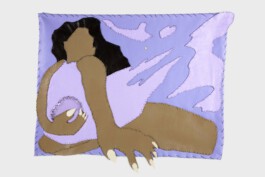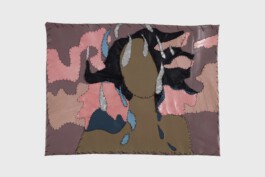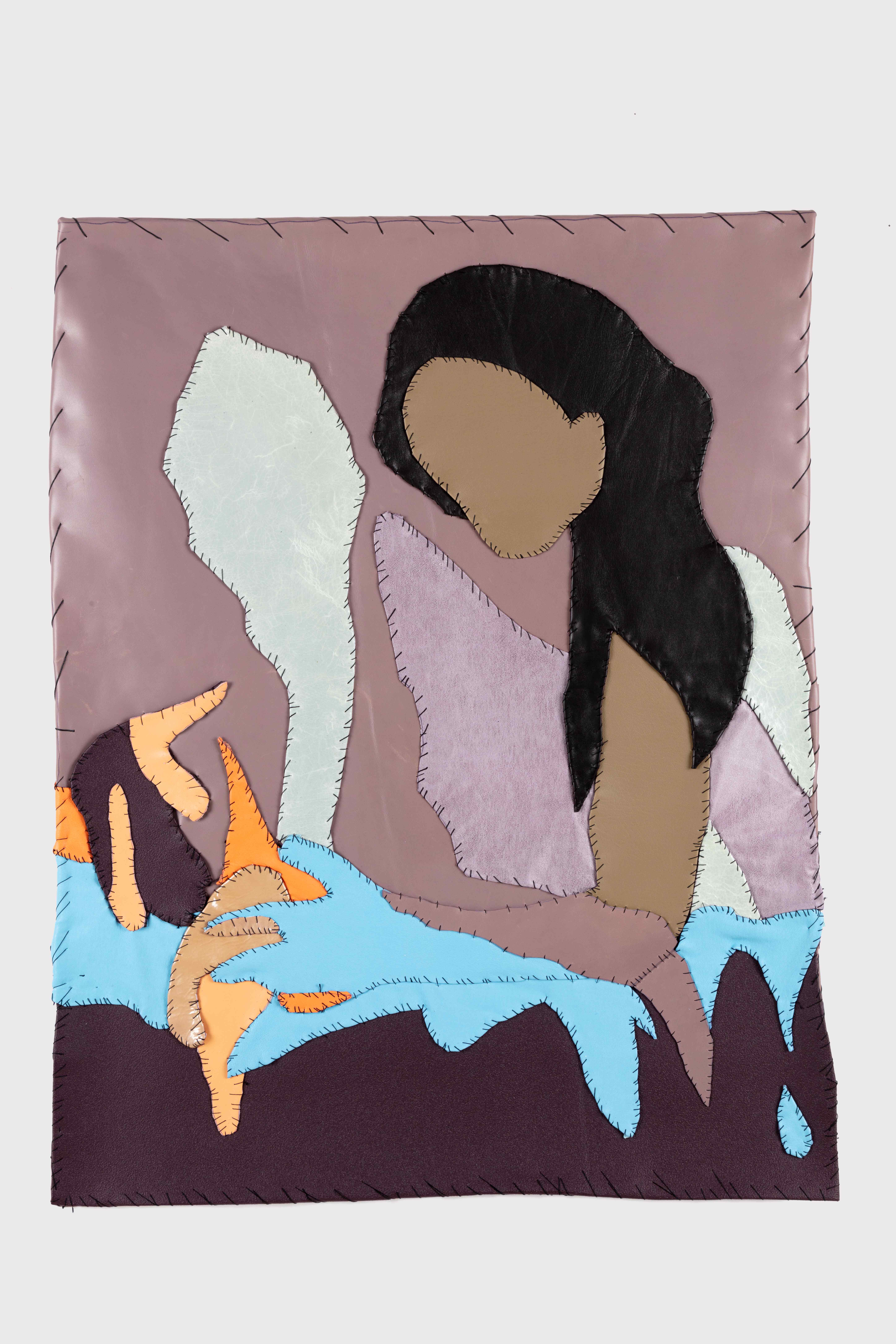Growing New Worlds
series of 13 handsewn works made of recycled Leather, 2023















Photos: Cheongjin Keem
Photos: Cheongjin Keem
Photos: Cheongjin Keem
Photos: Cheongjin Keem
Photos: Cheongjin Keem
Photos: Cheongjin Keem
Photos: Cheongjin Keem
Photos: Cheongjin Keem
Photos: Cheongjin Keem
Photos: Cheongjin Keem
Photos: Cheongjin Keem
Photos: Cheongjin Keem
Photos: Cheongjin Keem
Excerpt of the curatorial text by Ivana Marjanovic:
Looking inward, perceiving your own body (in solitude or together), staying connected, hearing and curing it are compelling practices, which seek to counter rational knowledge and neo-liberal pressures of productiveness, and are a call to step out of imposed temporal and spatial bindings into your own spacetime. “I wanted to imagine a place where surviving does not require cutting away from oneself, where no structures can trap me because I can hear my body, where I allow myself to feel my frustrations because I know that they will move me, where my fear will make me sharp and precise, where my anger will let me stop whatever is bothering me and where my resting is not seen as a waste of time but a responsibility,” the artist writes in her thesis (2019).
Her latest art works have evolved from Those Inbetween (Water me) (2022) and represent an aesthetic shift where Sophie Utikal moves from imaginary representations based on auto-fiction to the world of fantasy, which is triggered and inspired by anxiety and the uncertainty concerning the future of life on Planet Earth. This new artistic impulse is reflected in a change from soft textile fabrics, pastel colors and soothing forms, to harder materials (for instance artificial or upcycled leather) and rougher designs. This could indicate an expansion on the current narratives around self- and collective support practices and desires that also include the future transformations caused by scarcity and deficiency.
The melting of glaciers, extreme drought or rains, energy crisis, the extinction of species, which environmental movements have been discussing for decades, have only recently entered into the collective consciousness, subsequently changing the ways we relate to the present and the future. Even if the work series I thought we had more time (2021) could refer to many different things, it cannot not make us think of the prognosis that we as the human species will be unable to make it forever in this form on Earth and in the Universe. Surviving in the present form, which is limited by social discriminatory mechanisms resulting from ideological fictions (of race, nation etc.), opens up the question of the survival of organic life all together. Along that path into uncertainty and chaos, we will morph much more radically than those who transgress borders now, and become invisible or somebody or something else in order to survive. Hence, one could say this exhibition also reflects on what that harsher world might look like, and tries to imagine us in it together, as an inter-connected trans-border body, which may even extend beyond life. Amidst this seemingly melancholic meditation, it might be comforting to transcend “species-centrism” and re-envision the whole tree of life, of which humans are only a small branch, and perhaps trust in the powers of life’s evolution. As Sophie Utikal states, “We already had learnt how to breathe underwater once. In the wombs of our mother” and I would add to it we already learnt it before becoming humans at all.

Growing New Worlds
series of 13 handsewn works made of recycled Leather, 2023


















Photos: Cheongjin Keem
Photos: Cheongjin Keem
Photos: Cheongjin Keem
Photos: Cheongjin Keem
Photos: Cheongjin Keem
Photos: Cheongjin Keem
Photos: Cheongjin Keem
Photos: Cheongjin Keem
Photos: Cheongjin Keem
Photos: Cheongjin Keem
Photos: Cheongjin Keem
Photos: Cheongjin Keem
Photos: Cheongjin Keem

Photos: Daniel Jarosch
Excerpt of the curatorial text by Ivana Marjanovic:
Looking inward, perceiving your own body (in solitude or together), staying connected, hearing and curing it are compelling practices, which seek to counter rational knowledge and neo-liberal pressures of productiveness, and are a call to step out of imposed temporal and spatial bindings into your own spacetime. “I wanted to imagine a place where surviving does not require cutting away from oneself, where no structures can trap me because I can hear my body, where I allow myself to feel my frustrations because I know that they will move me, where my fear will make me sharp and precise, where my anger will let me stop whatever is bothering me and where my resting is not seen as a waste of time but a responsibility,” the artist writes in her thesis (2019).
Her latest art works have evolved from Those Inbetween (Water me) (2022) and represent an aesthetic shift where Sophie Utikal moves from imaginary representations based on auto-fiction to the world of fantasy, which is triggered and inspired by anxiety and the uncertainty concerning the future of life on Planet Earth. This new artistic impulse is reflected in a change from soft textile fabrics, pastel colors and soothing forms, to harder materials (for instance artificial or upcycled leather) and rougher designs. This could indicate an expansion on the current narratives around self- and collective support practices and desires that also include the future transformations caused by scarcity and deficiency.
The melting of glaciers, extreme drought or rains, energy crisis, the extinction of species, which environmental movements have been discussing for decades, have only recently entered into the collective consciousness, subsequently changing the ways we relate to the present and the future. Even if the work series I thought we had more time (2021) could refer to many different things, it cannot not make us think of the prognosis that we as the human species will be unable to make it forever in this form on Earth and in the Universe. Surviving in the present form, which is limited by social discriminatory mechanisms resulting from ideological fictions (of race, nation etc.), opens up the question of the survival of organic life all together. Along that path into uncertainty and chaos, we will morph much more radically than those who transgress borders now, and become invisible or somebody or something else in order to survive. Hence, one could say this exhibition also reflects on what that harsher world might look like, and tries to imagine us in it together, as an inter-connected trans-border body, which may even extend beyond life. Amidst this seemingly melancholic meditation, it might be comforting to transcend “species-centrism” and re-envision the whole tree of life, of which humans are only a small branch, and perhaps trust in the powers of life’s evolution. As Sophie Utikal states, “We already had learnt how to breathe underwater once. In the wombs of our mother” and I would add to it we already learnt it before becoming humans at all.